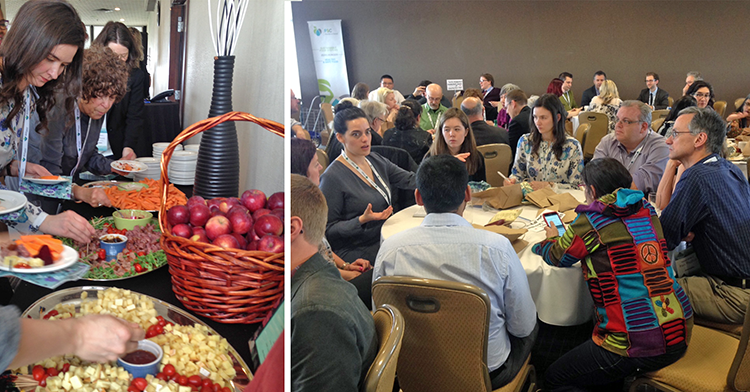Talking Food Policy at Progress Summit

On April 2, over 120 people representing unions, political parties, civil society, and more joined Food Secure Canada for a luncheon entitled Let’s Talk Food Policy at the Broadbent Institute’s Progress Summit in Ottawa. At the same event last year, FSC facilitated discussions around a national food policy that eventually fed into our Eat, Think, Vote campaign. This campaign, centred around the need for a national food policy, led to the announcement of such a policy in the mandate letter to the Minister of Agriculture.
This year, we wanted to explore various issues that ought to be included in a national food policy.
Specific issues addressed at Progress Summit
- Basic income and food security;
- A national food policy council;
- Affordable housing and food security;
- The social determinants of health;
- Democratic policy making;
- Farm renewal and transition;
- Local, sustainable food;
- Indigenous food security;
- Healthy school food;
- Advocacy, charities and the Canadian Revenu Agency;
- Youth engagement;
- The real politics of food;
- Climate change;
- International food insecurity;
- Workers’ rights.
For more information on the session, see the article written by the Western Producer. Thanks to Rachel Gray (The Stop Community Food Centre), Meg McCallum (Centretown Citizens Ottawa Corporation), Cody Sharpe (Upstream), Peter Andree (Carleton University), Genevieve Grossenbacher (USC Canada), Moe Garahan (Just Food Ottawa), Lauren Goodman (ITK), Carolyn Webb (Sustain Ontario), Holly Solomon (lawyer), Jeff Beaudry (Association of First Nations), Jonathan Chin-Fook (University of Ottawa), Rebecca Blaikie (New Democratic Party), Avi Lewis (journalist and filmmaker), Jared Klassen (Canadian Foodgrains Bank), and Pat Thompson (Atkinson Foundation) for facilitating such fruitful discussions.
Excerpts of the Western Producer article
- “Some spoke of their own budding green thumbs, sharing stories about growing food on their balconies, apartment rooftops and in community gardens.
- Several argued strongly in favour of local food with a heavy preference for organic and small scale agriculture, although several acknowledged Canada’s seasonal and geographic challenges.
- “Think about it. If we followed a local diet, we’d never be able to eat oranges again,” one man mused.
- Yet the biggest worry was access to affordable, healthy food, of which there were many definitions.
- Several in the room shared stories about individuals on fixed incomes unable to buy food.
- One woman from Newfoundland told the group she routinely sees seniors and young parents at the grocery store scanning the shelves for the cheapest food items available, “while looking longingly at items like fresh produce that they simply can’t afford.”
- “I often seen people pick food up, look at it and then put it back knowing they simple can’t afford it,” she said, with several nodding in agreement.
- Several insisted it was high time Canada had a national school food program, which would ensure all Canadian children have access to healthy breakfasts and lunches.
- The program, which Food Secure Canada has been pushing for for several years, would ensure Canadian children have access to and know how to prepare nutritious food.
“
- Log in to post comments


Comments
marketing for lawyers
I work for a software company that integrates with the website that marketing for lawyers Cheap SEO and their team have built for a mutual customer. Cheap SEO is great.